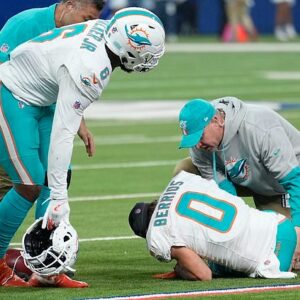Miami Dolphins receiver Tyreek Hill’s legal team is still in the beginning stages of pursuing legal action against the Miami-Dade Police Department and officers involved in his brief detainment before an NFL game earlier this month.
Hill’s team is filing public records requests with the department, according to Hill’s Atlanta-based attorney Julius Collins.
They are also speaking to people who have had similar encounters with MDPD and who, he says, did not have the same transparency Hill received when body camera footage of the Sept. 8 incident was quickly released publicly and picked up by news agencies nationwide.
And Hill’s attorneys are laying the groundwork for a section 1983 claim. Section 1983 is a federal statute that allows people to sue certain government entities and its employees for violations of their civil rights.
“Every legal remedy is on the table. Does he want police reform? Absolutely. Does he want this officer terminated? Absolutely,” Collins told USA TODAY Sports before the Dolphins host the Tennessee Titans on Monday Night Football. “We want to figure out if there’s a systemic problem within MDPD as far as how they police. We’ll go through everything before we actually file a 1983 action against MDPD, the Chief of Police there, as well as those officers that were involved.”
A representative for the Miami-Dade Police Department did not comment when reached by USA TODAY Sports because there is an open internal investigation and no civil case filed.
On Oct. 11, Hill’s not guilty plea will be submitted in court for two traffic tickets he received, leading to his detainment. He was cited for careless driving and a seatbelt violation while traveling at an estimated speed of 60 mph in his McLaren 720S, according to police. Hill will be represented by Miami-based attorney Adam Goodman in the traffic case.
Body camera footage showed Hill was pulled over and kept his window halfway down when an officer told him to put his window down completely. That set off a series of events that resulted in Hill being dragged out of his car, handcuffed and forced to the ground in a sitting position while the Dolphins star said he was having knee pain.
The police report of the incident said Hill was “weaving through traffic in an aggressive manner.” The report said Hill became uncooperative when asked to keep his window down and refused “several commands” to exit the vehicle. It described Hill as “passively and actively” resisting officer Danny Torres, who pulled Hill out of the car, by “tensing up and pulling away.”
Collins said the report was false and demanded accountability.
“The report that was completed on this matter by the officer who initiated a traffic stop, he claimed that Tyreek resisted,” Collins said. “He said Tyreek refused to sit down, which you see from the body camera, is absolutely incorrect. There has to be some accountability for those types of things as well, right?”
Director of the Miami-Dade Police Department, Stephanie V. Daniels, released a statement with the body cam footage a day after the incident saying the department is “committed to transparency and maintaining the public’s trust,” will conduct a thorough investigation and update the public during that process.
It has been 22 days since the detainment and the investigation is ongoing.
Torres remains on administrative duties after the incident. Personnel records show he has faced six complaints in 28 years with the department, alleging discourtesy, force violations, improper procedure and conduct unbecoming of an officer. Three of those complaints were sustained and he was cleared in the other three. Torres’ attorney is calling for him to immediately be reinstated.
In addition to Collins, Hill has assembled a legal team that includes former federal prosecutor Jeffrey A. Neiman (based in Fort Lauderdale, Florida), Stephen B. Kelly, Jr. of Jacksonville’s Rolle & Kelly (Jacksonville, Florida) and well-known civil rights attorney Devon M. Jacob (Mechanicsburg, Pennsylvania), who has served as counsel in high-profile civil rights cases nationally, including George Floyd, Kodak Black (Bill Kapri), Hunter Brittain, Pamela Turner, Christian Hall, Emantic “EJ”Bradford, and Eboni Pouncy.
Collins said Hill engaging a legal team is not a publicity stunt and some people have reached out to the football player with similar stories about Miami-Dade Police Department, causing Hill to educate himself on civil rights issues and officers’ points of views during arrests, along with their relationships with people of color.
“He wants to understand through the lens of law enforcement what they see whenever they make a traffic stop, what they see whenever they go to a call for an emergency call or anything. But he also has first-hand experience on the eyes and through the lens of a citizen,” Collins said. “He’s educating himself on legislation, the George Floyd bill. He’s actively reading. He’s researching, looking at every other person’s situation that he can find who’s willing to speak with them.”
Hill acknowledged he could have acted differently during the police encounter, but maintains his civil rights were violated.
“Yes, I will say, I could’ve been better. I could’ve let down my window in that instance,” Hill said during a Sept. 11 interview. “I don’t want attention, I don’t want to be cameras out, phones on you in that moment. But at the end of the day, I’m human. I’ve got to follow rules. I’ve got to do what everyone else would do.
“Now, does that give them the right to literally beat the dog out of me? Absolutely not. But at the end of the day, I wish I could go back and do things a bit differently.”



